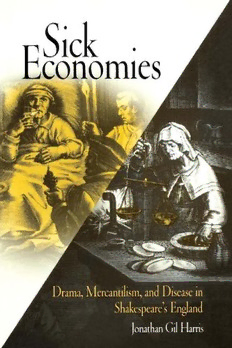
Sick Economies: Drama, Mercantilism, and Disease in Shakespeare’s England PDF
Preview Sick Economies: Drama, Mercantilism, and Disease in Shakespeare’s England
Sick Economies This page intentionally left blank Sick Economies Drama, Mercantilism, and Disease in Shakespeare's England Jonathan Gil Harris PENN University of Pennsylvania Press Philadelphia Copyright © 2004 University of Pennsylvania Press All rights reserved Printed in the United States of America on acid-free paper 10987654321 Published by University of Pennsylvania Press Philadelphia, Pennsylvania 19104-4011 Library of Congress Cataloging-in-Publication Data Harris, Jonathan Gil. Sick economies : drama, mercantilism, and disease in Shakespeare's England I Jonathan Gil Harris. p. em. Includes bibliographical references and index. ISBN o-8122-3773-0 (acid-free paper) 1. English drama-Early modern and Elizabethan, 1500-1700-History and criticism. 2. Economics in literature. 3. Mercantile system-Great Britain-History-16th century. 4· Mercantile system-Great Britain-History-17th century. 5· Shakespeare, William, 1564-1616-Knowledge-Economics. 6. Shakespeare, William, 1564-1616-Knowledge-Medicine. 7. English drama-17th century-History and criticism. 8. Great Britain-Economic conditions- 16th century. 9. England-Economic conditions-17th century. 10. Economics in literature. 11. Diseases in literature. I. Title. PR658.E35H37 2004 2003055561 for my sister Naomi Harris Narev (1968-2003) -b'a hava raba This page intentionally left blank Contents 1 The Asian Flu; Or, The Pathological Drama of National Economy 1 2 Syphilis and Trade: Thomas Starkey, Thomas Smith, The Comedy ofErrors 29 3 Taint and Usury: Gerard Malynes, The Dutch Church Libel, The Merchant of Venice 52 4 Canker/Serpego and Value: Gerard Malynes, Troilus and Cressida 83 5 Plague and Transmigration: Timothy Bright, Thomas Milles, Volpone 108 6 Hepatitis/Castration and Treasure: Edward Misselden, Gerard Malynes, The Fair Maid of the West, The Renegado 136 7 Consumption and Consumption: Thomas Mun, The Roaring Girl 163 8 Afterword: Anthrax, Cyberworms, and the New Ethereal Economy 186 Notes 191 Bibliography 235 Index 253 Acknowledgments 261 This page intentionally left blank 1 The Asian Flu; Or, The Pathological Drama of National Economy At the end of 1997, newspaper readers around the world were treated to a striking journalistic diptych. Alongside reports of the outbreak of a new, possibly lethal strain of chicken influenza in Hong Kong, there appeared the first articles detailing the turmoil and collapse of East Asia's "tiger" economies. The juxtaposition proved quite suggestive. Although the new strain of influenza turned out to be relatively innocuous, the language it generated was altogether more contagious: in a matter of days after the Hong Kong outbreak, Anglo phone reporters had dubbed the economic ills afflicting nations such as In donesia, Thailand, and Korea the "Asian flu:' or, with greater euphony, the ''Asian contagion:' The tigers were thus transmuted into morbid chickens, threatening to infect the economies of the West. The ''Asian flu" metaphor reveals a great deal. First, it bears witness to the constitutive role played by the body in shaping Western perceptions of the eco nomic. One might think also of eighteenth-century French Physiocrat theories of the blood-like circulation of wealth; the word "inflation:' which was origi nally a specialized medical term for "swelling"; the pathological connotations of "consumption"; Adam Smith's "invisible hand" of the market; or the organic et ymology of "capital" itself.1 Metaphors of infectious disease like the ''Asian flu" similarly disclose the corporeal images that, even in an age where the archaic logic of resemblance between microcosm and macrocosm no longer holds sway, continue to organize popular understandings of the economic. Just as strikingly, the metaphor lends expression to deep-seated fears about the vulnerability of national markets within larger, global networks of com merce. In these fears lurks an intriguing paradox. Fundamental to the notion of the nation's commercial health is an ambivalent conception of transnationality that works to naturalize the global even as it stigmatizes the foreign. The ''Asian flu" metaphor embodies this ambivalence particularly clearly. By troping eco nomic illness as a communicable condition that transmigrates across oceans, the metaphor attributes the cause of plunging stocks and evaporating capital around the world to specific foreign bodies rather than to global commerce it-
